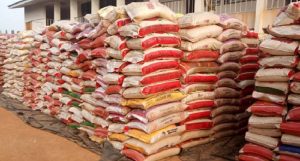The naira-dollar exchange rate has witnessed an unprecedented surge. The naira-dollar exchange rate, for several years, has been rising from less than ₦100 some decades ago to ₦700, ₦800, ₦1000 at a point, ₦1500 and it kept rising, defying the law of gravity.
As we progressed into the year, the exchange rate continued to rise until a dollar was sold for as high as ₦1,900 in the parallel market which is what is most easily accessible to Nigerians who want to buy or sell dollar. That was just an inch from ₦2,000.
Of course, with this rise in exchange rate, coupled with the price of petrol which is more than ₦700, courtesy to the fuel subsidy removal by the federal government in the middle of last year, the prices of commodities began to soar high as if they were aiming for the sky.
According to investigations carried out by Voice Plux in March this year, prices of foodstuffs ranging from staples to provisions increased by 25 to 45 percent. A 50kg bag of small grain polished rice sold between N60,000 and N65,000 in the first week of March increased to between N70,000 and N75,000.

A basket of garri jumped as high as N2500 and is now sold for ₦3,500 , while a basket of local and foreign rice flew beyond ₦5,000. White and brown beans are now sold for N4,500 and N5000..
Spaghetti and noodles that many people did not seem to reckon with refused to be left out of the price surge as the various brands sold for at least N950 to N1000 for spaghetti, while noodles sells at N500 per each a loaf of bread between N600 and N1500 depending on the size. As the list are unending.
This statistics are very true despite the now reduction in the exchange rate, dollar now goes for 1 USD = 1,201.5 NGN
During an interview with one Mrs Joy Oko who deals on foodstuffs ranging from (rice, beans, oil etc), in the modern market popularly referred to as “Ogbe-Ogonogo market” in Asaba Delta State. She claims that the major reason for the reduction of the food prices is because most goods were bought when the exchange rate was still at 1 USD = N1800-N1500, so it will be a great loss on their side if they sold the goods lesser that what it was been bought.
Nigeria’s food inflation surged to 40.01 per cent annually, which is 15. points higher compared to the rate recorded in the corresponding month last year.